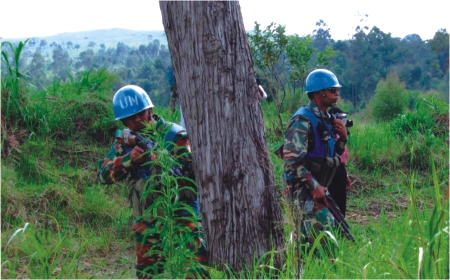 |
|
 |
|
 |
 |
|
 |
|
 |
|
 |
|
 |
|
The accomplish-ments of our UN peacekeepers are the pride of the nation. Nazrul Islam takes us behind the scenes on a tour of the peacekeepers' arduous missions and courageous triumphs in the most dangerous hot-spots in the world.
Blessed are the peace makers
It is widely acclaimed that the most outstanding national achievement in independent Bangladesh is the name and fame earned for the country by the peacekeepers of Bangladesh Armed Forces. Despite negative publicity for the country as a whole, the indomitable valour, firm commitment, exemplary leadership, outstanding competence, unflinching patriotism, and superb discipline shown by the Bangladeshi peacekeepers have earned plaudits for the country.
Bangladesh in UN peacekeeping
It was 1988 when Bangladesh's modest contribution began, with 31 officers as part of UNIMOG (UN Iraq-Iran Military Observer Group) in Iraq. Since that modest beginning, Bangladesh today is the largest and most respected contributor to UN peacekeeping efforts. Of total 60 peace missions mounted so far by the UN, Bangladesh has successfully participated in 30 missions in 23 different countries. So far over 49,000 personnel from Bangladesh Armed Forces have participated in these missions from Bosnia to Haiti to Georgia to Cambodia. Currently, UN is operating 16 peace missions with 70,103 peacekeepers from 107 member states. Of them, despite the smallness of its size and economy, Bangladesh alone has contributed 9,758 peacekeepers (more than 14 percent of the total), who are operating in 12 different UN missions in countries like Congo, Sudan, Sierra Leone, Liberia, Ivory Coast, among others, including leadership to UN mission in Sudan.The side of international peace
Bangladesh has always responded positively to the UN's call for restoration, maintenance, and strengthening of peace and stability worldwide. However, the price of peacekeeping has been at times very high. As many as 63 of our valiant soldiers, including 15 officers killed in a tragic plane accident in Benin in December 2003, have made the supreme sacrifice in the service of United Nations. Their sacrifice personifies the ideals that Bangladesh and the United Nations share, and reflects our abiding commitment to the UN Charter. In recent months, Bangladesh's own determination to stay on the side of international peace has been severely tested. In February 2005, nine Bangladeshi blue helmets were killed in action in Congo. Bangladesh received this news with deep sadness and pain, but its determination to keep supporting UN peace efforts was not weakened. In a remarkable display of solidarity, the government of Bangladesh and its people renewed the pledge to continue supporting UN peace efforts.Operational achievements
In the last 17 years of peacekeeping experience, Bangladesh Armed Forces have many striking success stories to their credit. A few operational achievements are briefly noted here, which should bear the testimony of outstanding performance of Bangladesh Armed Forces in unfriendly terrain, weather, and volatile situation:Former Yugoslavia: When Serb fighters turned up the heat in 1994, the Bangladeshi peacekeepers in Bihac played a vital role to bring the situation under control. Even being seized by Bosnian and Croat forces for 10 weeks, Bangladesh contingent at Bihac, displayed an indomitable courage, held their position, and thus upheld the United Nations flag.
Somalia: In the midst of a very volatile and complex situation in Somalia, 24 Pakistani and 18 US peacekeepers were killed in hostilities. This led to major policy changes and after negotiations, European as well as US forces decided to withdraw. In such a challenging environment, Bangladesh contingents displayed extreme patience, courage, and determination. They continued to guard the airport at Mogadishu, provided protection to US Logistic (Hunter) Base as well as escorted US personnel. When the decision to close the Somalia mission was taken, it was the Bangladeshi battalion which withdrew last, having ensured safe passage for other UN contingents.
Sierra Leone: The Bangladeshi peacekeepers have successfully played a vital role on the ground in making the first contact with the target groups in difficult and uncertain environments at different mission areas. For example, in Sierra Leone, as an effective and organized interface between the international community and the target groups, the Bangladesh peacekeepers have successfully deployed their own resources to initiate and maintain "pacification programs." In fact, in 1999, when the Sierra Leon mission was at its lowest ebb and some contributing countries had decided to withdraw, it was Bangladesh's commitment to the United Nations, which helped to reassert peacekeeper presence. Bangladesh's contingents were the pioneers in taking full control of rebel-held territories. On completion of the successful disarmament, elections were held in May 2002. The people of Sierra Leone and United Nations considered Bangladesh forces as pivotal for the success of the mission.
Congo: Following widespread violence that killed 50,000 people in war ravaged Ituri region of Congo, Bangladesh battalion of 1,066 members were deployed in Ituri region (which is bigger than the size of Bangladesh) in July-August 2003. A helicopter squadron of Bangladesh Air Force was also deployed here. The French-led International Emergency Multi-national Force (IEMF) handed over their responsibility to Bangladesh contingent which stabilised the volatile situation and facilitated the deployment of other contingents. "It was a disaster in Ituri because of armed conflicts. Bangladeshi peacekeepers have done a wonderful job to provide stability. They have done it professionally," said Force Commander of MONUC (United Nations Organisation Mission in DR Congo) Major General Illya Samaila in capital Kinshasa to a group of newsmen from Bangladesh.
Ivory Coast: In Ivory Coast, the UN mission established a "No Man Zone" to separate two forces and safeguard neutral people under UN auspices. The UN also established a 60 km wide East-West inviolable "Comfort Zone" (CZ). This zone fall within the area of responsibility of the Bangladesh contingent, whose duty was to guard and ensure security of the civilian people of this area. The Bangladeshi troops, by professional and impartial approach, have earned total confidence of the people living in the zone. However, in Feb-March of 2005, a militia group tried to capture a village of strategic importance in the CZ. Bangladeshi troops intervened and saved the village from falling into the hands of the government-supported militia, which could have led to complete breakdown of peace achieved so far. Thus, the timely action of the Bangladeshi troops not only prevented riot but also checked reopening of conflict. And all this was done without any bloodshed.
Peacekeepers as ambassadors
No doubt, the peacekeeping operations are difficult, but Bangladeshi troops have not only well adopted in alien hospitable atmosphere but their humanitarian effort, human quality, discipline, and respect to local customs has made a name wherever they have served. In fact, adherence to the UN Mandate, impartiality, respect for human rights and humanitarian services, are part of our peacekeeping philosophy. It is notable that peacekeeping operation warrants working with the civilian components and troops of other countries.Wherever they have served, the Bangladeshi soldiers developed excellent understanding with the civilian components of the mission and solid working relationship with other members of the UN multinational force. This has further increased our credibility. Moreover, Bangladesh contingents understand well that they are integral part of the multinational peacekeeping forces and have never created any command and control problem. As a result, the United Nations, contributing countries, the conflicting parties, as well as non-combatant locals, always welcome the Bangladeshi peacekeepers.
The highest standard of discipline and professionalism of Bangladeshi peacekeepers has been duly acknowledged by all concerned. For example, Maho R. Cyprien, president of the pro-government armed militia group of Ivory Coast, has said: "The Bangladeshi soldiers never touched even the hands of our women. We are very grateful to the Bangladeshi soldiers." The leader of the DOZO ethnic group "Laceni Konate," well known for their ferocity, asserts: "We have nothing to say against the Bangladeshi soldiers. We are happy with them as they work impartially." Thus, due to humane and impartial role of the Bangladeshi soldiers, Bangladesh has been internationally acclaimed as champion of human rights and dignity for all, equality and fair dealing, and most importantly, world peace and security. The UN acknowledges: "The Bangladeshi soldiers are in demand because they have proved themselves to be highly disciplined."
In addition, Bangladesh has not only played a very significant role in quickly restoring peace and stability in the troubled regions of the world, but has done a remarkable job in post-conflict peace building efforts. Consequently, the Bangladeshi flag, hitherto unknown in many parts of the globe, is not only known in these remote countries but has become the most sought after souvenir in countries where they are deployed. Besides, streets, parks, and markets are being named after Bangladesh, even, being named after individual commanders. Moreover, Bengali language and the national anthem of Bangladesh are commonly learned by the locals. Thus the locals developed love and affection for the members of Bangladesh contingents who risked their lives for their security and served them for better tomorrow through their human touch. They crossed even the language barriers to reach out to the people at times beyond the call of their duty.
Today the peace-hungry people in the townships of different UN mission areas celebrate the arrival of Bangladeshi contingents, greet them with open arms, sing Bangladeshi songs, wave Bangladeshi flag, and dance for the troops. They see them off with tears when the Bangladeshi soldiers return home after completion of the tour of duty. All these are nothing but manifestation of their love and respect for Bangladeshi soldiers. As a result, the Bangladeshi peacekeepers are not only enhancing Bangladesh's image, but actually have been working as ambassadors of goodwill with distinction.
It is worthwhile to note here that President of Sierra Leone Ahmad Tejan Kabbah visited Bangladesh in October 2004 to pay his respect to the people of Bangladesh for Bangladesh's outstanding role not only in peacekeeping but also in unifying the people of Sierra Leone after nightmare of civil strife. President Kabbah said that apart from peace-keeping, the Bangladeshi troops also took part in construction of infrastructures like roads, schools and hospitals. "People of Sierra Leone not only just welcomed Bangladeshi soldiers but they don't want to let them leave their country," President Kabbah noted.
Fostering International friendship
Another important benefit of Bangladesh's exemplary performance in UN peacekeeping operations has been on the diplomatic front. Frequently associated in the public mind with disasters, poverty, strikes, and natural catastrophes, Bangladesh is now projecting a new role for itself on the international stage by sending its troops everywhere to wear the blue helmets. In fact, the active participation of Bangladesh in global peacekeeping has played a definite role to revitalize the UN. It has now been established that the United Nations and international community also needs the cooperation of Bangladesh.Successful participation of Bangladesh in peacekeeping missions provides opportunity to develop relations of friendship and cooperation with many countries, including powerful ones. Now Bangladesh has more friends and admirers in international circles.
Conclusion
The aim of the blue-helmet soldiers of Bangladesh was to raise high the national image. In discharging their noble duties they remained calm when attacked, composed under provocation, and kept the blue flag high under trying conditions. The glorious role of our peacekeepers has helped erase the country's bad name. Now we are a respected nation. Bangladesh is now the world's biggest contributor of troops to United Nations peace missions. It is also now also widely acknowledged that we are well-trained and highly professional armed forces, and that we are armed forces of a democracy, one that leads in pursuit of democratic values. Our quest for excellence and determination for upholding the ideals of peace and security will remain ever unflinching. Above all, the sprit of the War of Liberation and the supreme sacrifices of three million people will continue to remain as the source of inspiration for our total commitment to a democratic and peaceful world.
............................................................
Lt. Col. Nazrul Islam is Director of Inter-Service Public Relations (ISPR) Directorate.
